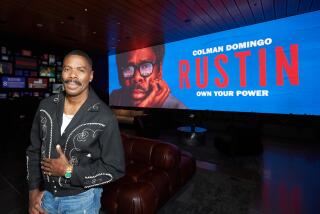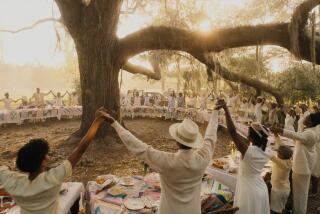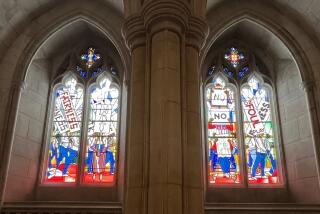Q&A: Documentary ‘The Black Panthers: Vanguard of the Revolution’ illuminates past and present
Among the most enduring images of the tumultuous era of the 1960s and ‘70s remain those of the Black Panther Party for Self-Defense. With their mix of media-savvy image-making and revolutionary rhetoric, they are now widely seen as symbols of resistance and defiance.
Yet the Panthers have also always been shrouded in controversy, growing from a local group in Oakland to a national organization that sparked the interest of the public, the media and the FBI alike.
The new documentary “The Black Panthers: Vanguard of the Revolution,” directed by celebrated filmmaker Stanley Nelson, attempts to unravel the complicated history and legacy of the group. Through archival footage and recent interviews with former party members the film is a primer for those new to the story while full of rich detail for those already familiar with the Panthers’ saga.
In his review for The Times, critic Kenneth Turan pointed to some of the leading figures of the organization by way of looking at their enduring relevance.
Turan asked, “Huey P. Newton and Eldridge Cleaver are dead, Bobby Seale is 78, Kathleen Cleaver is 70, the events that turned all of them into national figures are decades in the past. So how is it that ‘The Black Panthers: Vanguard of the Revolution’ comes off as the most relevant and contemporary of documentaries?”
SIGN UP for the free Indie Focus movies newsletter >>
In the Chicago Tribune, critic Michael Phillips said of the film, “It’s a strong reminder of the times, then and now .… ‘The Black Panthers’ relates to our present moment without even trying.”
In the New York Times, critic A.O. Scott spoke to the film’s unexpected contemporary significance by noting, “It’s easy enough, in hindsight, to romanticize the charisma of the Panthers and their leaders, or to criticize them for focusing on self-presentation and imagery rather than on more substantive issues. But what is clear from this sober yet electrifying film is that the power of the Panthers was rooted in their insistence — radical then, radical still — that black lives matter.”
Among Nelson’s previous films are “Freedom Riders,” “Jonestown: The Life and Death of Peoples Temple” and “The Murder of Emmett Till.” “The Black Panthers” was his eighth film to premiere at the Sundance Film Festival. Nelson has won numerous Emmy awards and has also received a MacArthur Foundation Fellowship and a National Humanities Medal
The film, which will be broadcast on PBS in 2016, is now playing at the Nuart Theatre in Los Angeles and opening in other cities around the country. Nelson recently called in from his office in New York City to talk about the film.
How do you feel about the film having a theatrical release?
I’m extremely excited. I’ve been working in film for 35, 40 years and this is the first film that I’ve made that’s had a real theatrical run. So it’s just a while new thing for me. It’s just incredibly different from the other films, the press is different, the people we’re reaching are different. And I think a whole bunch of different kinds of people will come to the theater to see the film and will spur a discussion that’s very different from the other projects that we’ve made.
And I think obviously the film is coming out at an amazing time when we’re talking about issues that were relevant 50 years ago.
Can you talk a little more about that? The film has taken on a new-found relevance due to recent events here in the country, even since it premiered at Sundance earlier this year.
I think that when we started the film, which was seven years ago, we knew that so many things that the Panthers were calling for in the 10-point plan, better housing, better schools, full employment, jails that didn’t incarcerate incredible numbers of African Americans, and central to all of that was police brutality. They were calling for an end to those things.
We knew those things obviously were still with us and that was going to be part of the discussion of the film, that you can’t see the film without thinking, wow, those things that they called for 50 years ago are still with us today. But obviously we had no idea that we would be in this moment that we’re in now where the tragic deaths of the last year, year and a half, have really changed the way so many people in this country now are looking at police brutality. And also expanding to look at race and where the country is on race. That’s a discussion we didn’t have seven years ago.
How did you find a balance in the film between the story of the Panthers as an organization and the individual stories of the powerful personalities that were a part of it? Really you could have made individual films for Huey Newton or Bobby Seale or Eldridge Cleaver or Kathleen Cleaver. Was that a challenge?
That was definitely something that was very difficult. But we wanted to tell the story of the Black Panthers. And we wanted to tell it through some of the iconic members. We also wanted to make sure that the film talked about and dealt with what we called the rank and file, the everyday members, and women in the movement. So in some ways we had to almost beat back Huey and Bobby and Eldridge and Kathleen to say it’s about the bigger story then the individual stories.
We wanted to talk about those personalities, but we also wanted to be in the context of the Panthers, that was the real story we wanted to tell. So it was a matter of keeping the story in perspective but also keeping the people in perspective. It was a balancing act we had to deal with.
The film has already received some criticism for its portrayal of the Panthers, most notably from one-time Panther leader Elaine Brown. Were you surprised by that?
We knew from the beginning that there would be people within and outside the Panthers who may not be entirely happy with what we’ve done. We’ve probably shown the film to over 100 Panthers, we’ve had two that really objected to something in the film. And I’ll take those odds any day.
The film really highlights the role of women within the party, even as some of the individual men involved had attitudes about women that didn’t always square with that. Did you know that going into the project, or was that something that emerged as you were making the movie?
I would say that is one which really emerged as we were making the movie. We knew there were women in the party, but we didn’t have a clear understanding going in how much the women really did. That was something we discovered as we went along and felt it was essential to include. The way most people see the party is men -- men standing there with a big Afro, arms crossed, looking mean. And the party was something different.
One of the useful things in having a single film telling the story of the Black Panthers is that for many people they remain so hard to pin down, just what they were about or what they accomplished. Their story is hard to figure out.
But that’s what makes a good story. It’s not simple. It’s not this rise into positive-ness, there’s some real negativity there, there’s some destruction that comes from within, not only from without. And as a filmmaker, that makes the story that much richer. So it’s trying to figure that out. In talking to people, in interviews, you come to understand that more and more. It was [former Panther] Jamal Joseph who said, “We made mistakes, but what drove us was an undying love for the people.” And I think in some ways that’s what the film is about, that was what drove them and a lot of mistakes were made.
I never want to say we’re doing the definitive piece on anything, I think that’s a trap. But we did want to have a film that included the rise and fall of the Black Panther Party and not be talking about just one or two individuals or incidents. We really wanted it to be about the rise and fall of the party.
Follow on Twitter: @IndieFocus
More to Read
Only good movies
Get the Indie Focus newsletter, Mark Olsen's weekly guide to the world of cinema.
You may occasionally receive promotional content from the Los Angeles Times.







